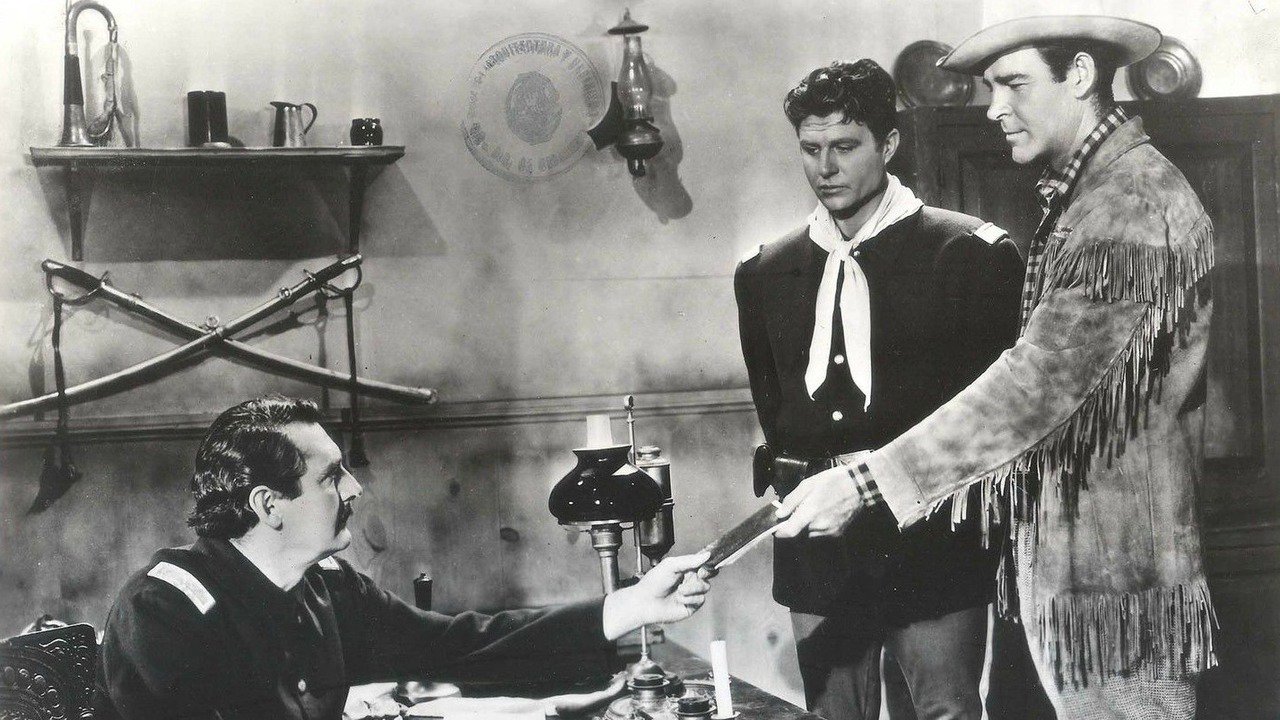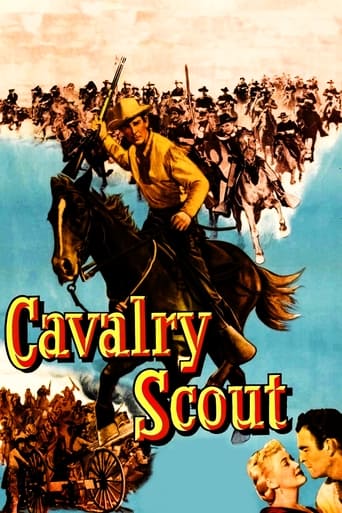

Out of Monogram Pictures, Cavalry Scout is directed by Leslie Selander and written by Dan Ullman. It stars Rod Cameron, Audrey Long, Jim Davis, James Milican, James Arness and John Doucette. Music is by Marlin Skiles and Cinecolor cinematography is by Harry Neumann."In the year 1876, while the United States was still recovering from the devastating effects of the Civil War, it found itself confronted with the tremendous responsibility for protecting its pioneers who were rapidly crowding into the Great West. Here the Indian nations, realising the threat to their lands, were organised for total war under the leadership of Sitting Bull and Crazy Horse, the great chiefs of the Sioux and Cheyenne nations. To protect its settlers, the Federal Government built a number of forts along the frontier, and garrisoned them with raw recruits; Union Army veterans, and even former Confederate Soldiers, all now united in the common defence. Introduced into this already seething situation was the factor of the Gatling Gun. Adopted by the army in 1866, this rapid-fire gun was the most terrifying weapon yet seen on the frontier. With it a few men - be they Soldiers or Indians - - could be masters of hundreds........"The cavalry scout of the title is Kirby Frye, played by Rod Cameron, who is on a mission to locate stolen Gatling Guns before they are traded to the Indians by unscrupulous white men operating out of Red Bluff. "B" Western story telling staples do follow.It's a very talky Oater, something which doesn't help a film that is already suffering due to being photographed in the notoriously bland Cinecolor lenses. This really should have been better, given the story has great interest on the page. The post Civil War amalgamation of soldiers for one cause is potent, as is the fact that Custer's last stand occurs during the tale. It's also commendable that Long's character isn't just in here for sexual tension dressage. Claire Conville is a thriving business woman holding important standings in Red Bluff, she's feisty to boot. There's good thought in the screenplay, with even some pro Indian sentiments that are most welcome, but sadly the pic never fulfils its promise, wasting not only the thematic opportunities, but also a very committed and engaging cast. The finale is exciting, because oh my are those Gatling Guns awesome, but ultimately it's a frustrating experience for seasoned Western fans. Even for those who love the "B" productions of yore. Mark this down as a decent time waster, but no as an essential seek out. 6/10
... View MoreOK so this is a routine western but why is that, in itself, so bad? Studios such as Monogram and Republic were adept at turning out exactly what B western audiences wanted to see and understandably worked on the principle of "if it ain't broke don't fix it".For those of us who still enjoy reliving those magical days of yesteryear, this is perfectly acceptable stuff. Rod Cameron is noble and heroic, the bad guys are very bad, the pretty girl is feisty but needs male support and the soldiers and Indians sort out their differences in the end. In other words, all is as it should be in B Western Land! And to the reviewer who commented that no one had shown any interest in "restoring" the pale and washed out colour, I would make the point that the Cinecolor process was notoriously bad and what you see now is exactly what cinema-goers saw half a century ago. So there's really nothing to restore......
... View MoreThe major drawback of this movie is that it was shot in a truly mediocre colour process known as Cinecolor which gives it a dull,grainy ,washed out air which is not at all pleasant to look at .Ignore this ,assuming you can ,and you may find yourself able to give it a slightly higher rating than my modest 6 . The picture is set in 1870's Montana where former Confederate officer ,turned civilian scout for the US Cavalry ,Kirby Frye (Rod Cameron) is sent to find out who has stolen a consignment of Gatling Guns with the aim of using them on robberies and also selling them to the Cheyenne and Sioux who are readying for battle against Custer .The villain is a local freight hauler Martin Gavin (James Millican ) .Frye is helped in his task by Lieutenant Spalding (Jim Davis)and he also finds time to romance the shrewd and lovely local business woman Claire (Audrey Long) ,at whom Spalding has also set his cap.Future star spotters will enjoy seeing James Arness in a rare bad guy role .Some pro-Indian sentiments are voiced ,which sets it apart from some other movies of the era but essentially this is routine fare although brisk direction by veteran Lesley Selander helps as do some effective performances .It is just such a pity the colour is so drab as better and brighter colour would have boosted interest considerably.Its watchable but nothing more
... View MoreThis low-budget western programmer is as bland as they come. Even the colour, after half-a-century and nobody (understandably) showing any interest in restoring it, is pale and washed out. Rod Cameron plays the eponymous cavalry scout on the hunt for a stolen Gatling gun the government believes someone is trying to sell to restless Indian natives. He's a little too old for the role of leading man, but he probably needed the work and so was no doubt cheap to hire. The plot is strictly by-the-numbers stuff with no attempt at characterisation beyond the good-bad template Hollywood studios seemed to apply to all characters in their minor westerns. This one was produced by one of the Poverty row studios – Monogram or Republic, I forget which one – which probably goes a long way to explaining why it is so insipid and unambitious. Unless you're on some sad mission to be one of the few people in the world to have viewed all Rod Cameron or Poverty Row Studios' output I'd give this one a wide berth.
... View More